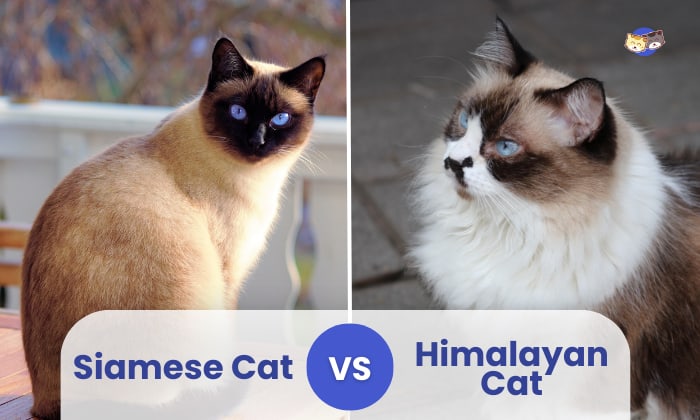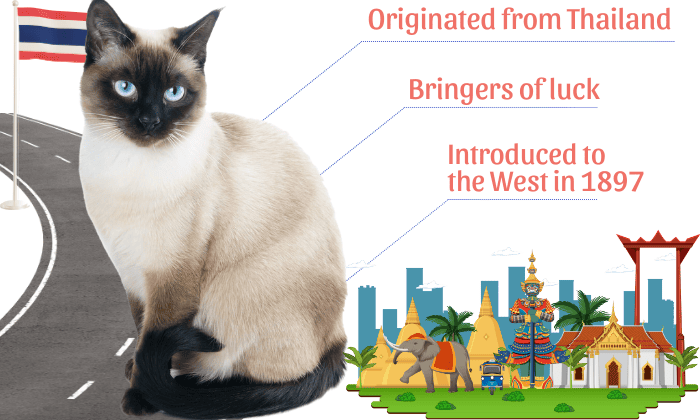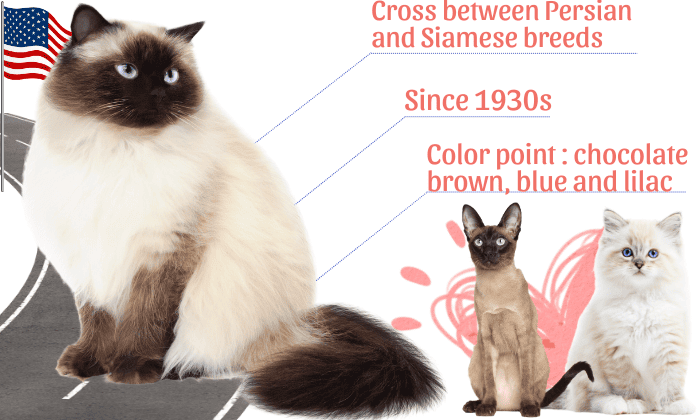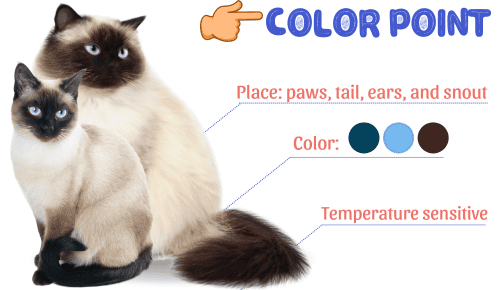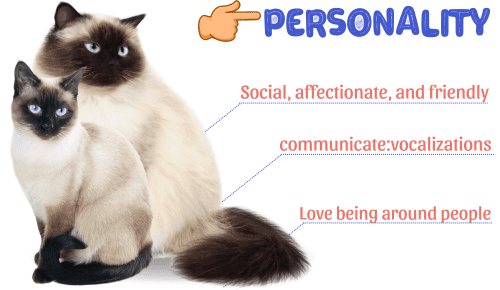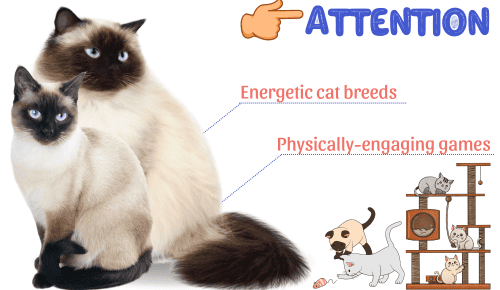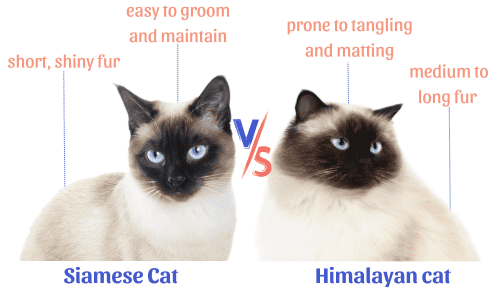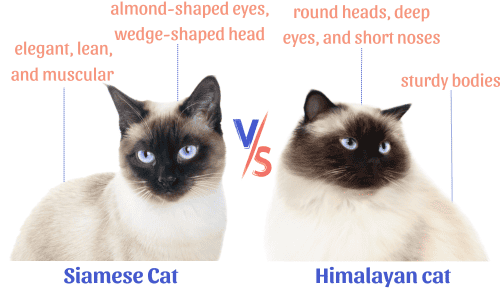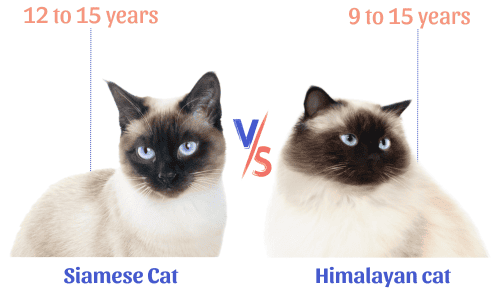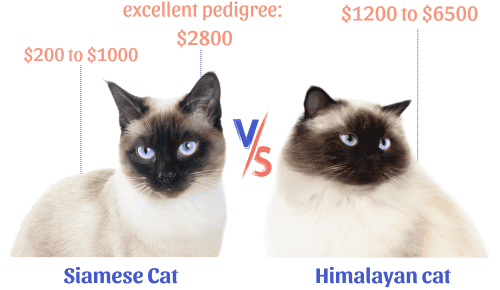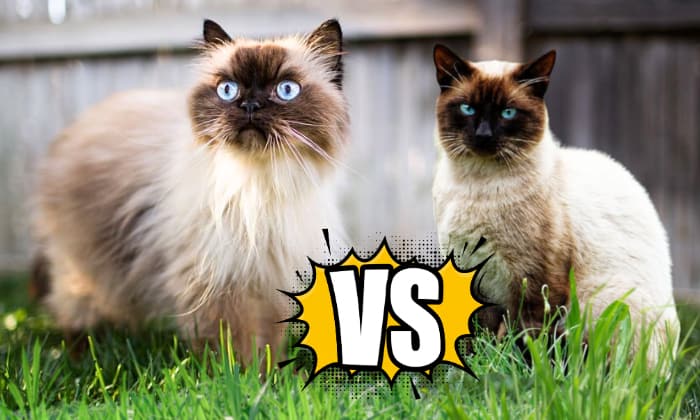Siamese and Himalayan cats share similarities in terms of color markings. However, Himalayan is only a cat that looks Siamese but isn’t.
In fact, these feline breeds have a lot of differences in terms of their weight, body shape, fur lengths, and general care requirements.
If you’re looking to adopt a cat and these breeds are your choice, then stick around! This article will discuss everything you need to know about Siamese vs Himalayan cats.
Table of Contents
What is a Siamese Cat?
A Siamese cat is a popular domestic feline breed known for its striking appearance and personality. The breed originated from Thailand, then called Siam.
Back in the old days, the people of Siam considered Siamese cats as bringers of luck.
Moreover, the breed was first introduced to the West in 1897. The first Siamese cat was brought to the US by a US diplomat in Bangkok as a gift to President Rutherford Hayes’s wife.
What is a Himalayan Cat?
The Himalayan cat is a cross between Persian and Siamese breeds, hence, it has features similar to both of them. United States breeders Dr. Clyde Keeler, Marguerita Gorforth, and Virginia Cobb, crossed the two felines in the early 1930s.
They aimed to create a Persian cat with a Siamese feline’s color point pattern and these breeders got exactly what they wanted. They were able to produce a cat that looks almost exactly like the Persian breed but has the color point pattern of the Siamese cat.
Apart from the usual chocolate brown color point, there are also seal point, blue point, and lilac point Himalayans, to name a few.
Similarities Between Siamese and Himalayan Cats
1. Color point
Siamese and Himalayan cats both feature color point patterns. This means that their paws, tail, ears, and snout have a darker color in comparison to the rest of their bodies.
As mentioned, some of the popular color points of Himalayan and Siamese cats are seal point, blue point, and chocolate point. The pigment in the coats of these cats is temperature sensitive, meaning their fur looks darker when their skin feels cool.
2. Personality: Affectionate and vocal nature
Siamese and Himalayan breeds are both social, affectionate, and friendly. These cats are known for their ability to communicate through vocalizations, making their needs and desires abundantly clear to their caregivers. You will quickly know when they need something by their scratching or vocalizing.
They tend to form strong bonds with their caretakers, especially if you earn their trust. Unlike most cats that like being alone, these breeds love being around people.
3. Need for attention
The said feline breeds are extremely energetic. For this reason, you need a good amount of time to provide them with physical activities.
Siamese and Himalayan cats need problem-solving activities, physically-engaging games, and other activities that may stimulate their minds. This way, you will prevent these cats from experiencing boredom.
If you are planning to take any of these feline breeds as your new family member, noting the importance of attention and physical activities is crucial. Failure to provide these needs can make your pet destructive.
Himalayan Cat vs. Siamese: Distinguishing the Differences
| Siamese Cats | Himalayan Cats | |
| Coat Length And Texture | Short, silky fur that is easy to groom | Long and luxurious fur that is similar to that of a Persian cat |
| Body Type | Lean and muscular | Sturdy and muscular |
| Life Expectancy | 12 to 15 years | 9 to 15 years |
| Price | $200 to $2800 | $1200 to $6500 |
1. Coat texture and length
- Siamese cats boast short, shiny fur that lies close to their skin. The length of their coat makes them easy to groom and maintain.
- Himalayan cats have medium to long fur that feels silky to the touch. The breed got this gene from its Persian ancestor, which is known for its long and elegant coat. However, the long fur of Himalayan cats is prone to tangling and matting, making them difficult to groom.
2. Body type
- Siamese cats are popular for their elegant, lean, and muscular bodies. These felines have almond-shaped eyes resting on a wedge-shaped head.
- Meanwhile, Himalayan felines have sturdy bodies that resemble those of a Persian cat. They have round heads, deep eyes, and short noses.
3. Lifespan
Siamese cats have a life expectancy of 12 to 15 years, while Himalayan cats can live for 9 to 15 years. Still, it’s worth noting that you can increase this lifespan by providing your pet with a quality life.
4. Price
- A Siamese kitten bought from a reputable breeder can cost anywhere between $200 to $1000. Siamese cats with an excellent pedigree may even reach a price of $2800.
- On the other hand, Himalayan cats are more expensive, as they can cost around $1200 to $6500.
Regardless of your feline choice, it is vital to get your pet from a reputable breeder. This will help you avoid scams.
Some breeders will tell you that you are getting a pure-bred Himalayan cat, but in reality, they are selling a Himalayan cat mixed with Siamese – a mix that you may not notice due to its parents’ color similarities.
Which Breed Should You Choose?
Selecting between Siamese and Himalayan cats hinges on your lifestyle, preferences, and commitment to their specific care needs.
Despite their similarities in engagement needs, Himalayan cats are a bit less active than Siamese cats. While the latter might need you for the most part of the day, Himalayan felines can spend a few hours alone.
- So, if you are often not home every day due to your job or lifestyle, a Himalayan cat is an ideal feline choice. They will do well on their own and will quietly wait for you to come home.
- On the other hand, feline enthusiasts who are always home may benefit from the clingy and chatty nature of Siamese cats. They love being around their caretakers, so you will have company at home 24/7.
Conclusion
Siamese Vs Himalayan cats – this comparison reveals that Himalayan cats have similar color point patterns, personalities, and needs to Siamese cats. The ancestors of this feline breed are Persian and Siamese cats, so it inherited not only its genes but also some of its personalities.
Whether you’re drawn to the talkative and social Siamese or the luxurious allure of the Himalayan, ensuring a nurturing environment that meets their unique requirements is paramount. We wish you a harmonious life with your future companion!

I am Amy Sawy, a Doctor of Veterinary Medicine (DVM) graduate from the University of Kansas. y husband, Dr. Plummer, and I own a veterinary clinic in Phillipsburg, Kansas. In addition to my professional background, I am a devoted pet owner myself, with a household that includes dogs, rodents, and most notably, cats – a total of five felines in my home.
In 2020, I joined an organization as a professional writer, leveraging my experience and collaborating with my team to deliver the most valuable information for your cat’s care.


